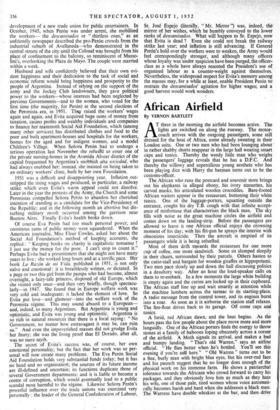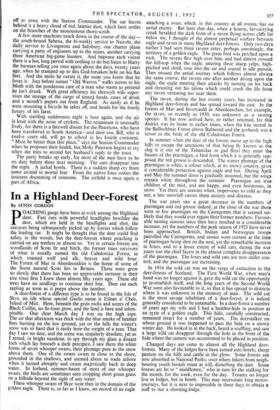African Airfield
By VERNON BARTLETT
three in the morning the airfield becomes active. The lights are switched on along the runway. The motor- coach arrives with the outgoing passengers, some still dressed for the heat of Africa, some already sweating in their London suits. One or two men who had been lounging about in rather shabby shorts reappear in the large hall wearing smart caps and tunics. Thereby the weedy little man who weighs the passengers' luggage reveals that he has a D.F.C. And thereby the willowy and supercilious young aesthete who has been playing dice with Harry the barman turns out to be the customs-officer. .
The African who runs the postcard and souvenir store brings out his elephants in alleged ebony, his ivory statuettes, his carved masks, his articulated Wooden crocodiles. Bare-footed African waiters appear in the restaurant, buttoning their white tunics. One of the luggage-porters, squatting outside the entrance, coughs his dry T.B. cough with that infinite accept- ance of misfortune that characterises the black man. The sky fills with noise as the great machine circles the airfield and comes down on the landing-strip. Before the passengers are allowed to leave it one African official enjoys the crowning moment of his day; with his flit-gun he sprays the interior with obnoxious insecticide. Then the aircraft is emptied of its passengers while it is being refuelled.
Most of them drift tcrards the restaurant for one more cup of coffee, one more sandwich. Some sit slumped sleepily in their chairs, surrounded by their parcels. Others hasten to the curio-stall and bargain for wooden giraffes or hippopotami. Two men pace slowly up and down the hall discussing politics in a desultory way. After an hour the loud-speaker calls on them to re-embark. In a few moments the large white building is empty again and the curios are locked up in their cupboard. The African staff line up and wait smartly at attention while the machine lumbers across the tarmac to its starting-place. A radio message from the control tower, and its engines burst into a roar. As soon as it is airborne the station staff relaxes. The fire-float drives back to its garage. Off come caps and tunics.
A lurid, red African dawn, and the heat begins. As the hours pass the few people about the place move more and more languidly. One of the African porters finds the energy to throw stones at a family of baboons loping obscenely across a corner of the airfield. A Moth signals its arrival, and makes a bad and bumpy landing. " That's old Warren," says an airline official. ' He flies better when he's bottled. You'll see this evening if you're still here." " Old Warren " turns out to be a fine, burly man with bright blue eyes, but his over-red face and his paunch suggest that he no longer does enough of the physical work on his immense farm. He shows a patriarchal tolerance towards the Africans who crowd forward to carry his packages, and they obviously love him as much as they hate his wife, one of those pale, tired women whose voice automati- cally becomes harsh and hard when she addresses a black man. The Warrens have double whiskies at the bar, and then drive off to town with the Station Commander. The car leaves behind it a heavy cloud of red, laterite dust, which later settles on- the branches of the monotonous thorn-scrub.
A few more machines touch doWn in the course of the day— the south-bound Sabena, the bi-weekly service to Nairobi, the daily service to Livingstone and Salisbury, one charter plane carrying a party of engineers up to the mines, another carrying three American big-game hunters. And between each visitor there is a hot, long period with nothing to do but listen to Harry the barman telling you once again about the days, twenty years ago, when he tramped up to this God-forsaken hole on his flat feet. And the more he curses it, the more you know that he loves it. Just before sunset " Old Warren " walks across to his Moth with the ponderous care of a man who wants to pretend he isn't drunk. With great efficiency his shrewish wife super- vises the storage of the cargo of tinned, foods, cases of drink and a month's papers out from England. As easily as if he were mounting a bicycle he takes off, and heads for the lonely luxury of his farm.
With startling suddenness night is here again, and the air is loud with the noise of crickets. The restaurant is unusually lively, for there is a farewell dinner for the Patersons, who have been transferred to South America—and their son, Bill, who is twelve years old, will go to school in his fourth continent. " Must be better than this' place," says the Station Commander when he proposes their health, but Molly Paterson begins to cry when she tries to second her husband's reply to the toast.
The party breaks up early,. for most of the men have to be on duty before three next morning. The cars disappear into the night. A jackal howls. There is a sudden sharp cry from some animal in mortal fear. From the native lines comes the insistent drumming of tomtoms. The airfield is once again part of Africa.



























 Previous page
Previous page